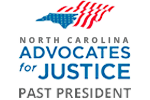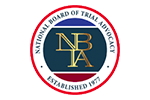YOUR LAWYERS.











Insurance Defense Lawyer – John Nunnally – Part 6
Insurance Defense Lawyer John Nunnally joins Law Talk with Bill Powers, discussing:
- The Practice of an Insurance Defense Lawyer
- Professionalism
- Trial Strategies
- Professional Development
There are different reasons for that. And I’m not talking about people that blow twice the legal limit. I’m talking about people that are right on the borderline. This was something that the governor’s task force really worked on, was trying an educational aspect of things. I personally wish we would put little markings on glasses like they do in Europe so that people know how much they’re getting in the relative strength of things, and educating people when they’re in high school and getting their license and things like that.
John Nunnally: Yeah, having seen so much of it in court and in auto wrecks too, given the potential for punitive damages for drunk driving and in an accident. You’re right, it can sneak up on them, and it’s been something I’ve been very cognizant in my own career because it’s not anything I want to have happen to me.
Bill Powers: Right. Right. And the cap on punies doesn’t apply on drunk driving cases. So whereas you may have a quarter million dollar punitive damages cap, that’s not the case in impaired driving cases. The sky’s the limit. Well, John, you mentioned something, and I’m going over time, but, I mean, I’ve got this font of information I’ve got to ask you some questions about some of these [crosstalk]-
John Nunnally: Sure. Okay. Sorry.
Bill Powers: I appreciate you taking the time. No, no, it’s been really a pleasure speaking with you and kind of catching up. And we’re talking about drinking, we’re talking about drunk driving, and you said something you even watch yourself. On my side of the aisle, we talk about differences of personalities and things. I’ve seen a lot of what I call flame-outs with lawyers, meaning that they’re the hot Roman candle from the Texas Panhandle, and they are bright light and then something happens in their personal life, whether it’s alcohol, substance abuse issues, mental health issues, where it’s just this flame-out, a meltdown. It’s terrible. You had mentioned that you are very satisfied in your job and you have a fulfillment in what you do. What do you think about the status of mental health and substance abuse issues in the profession right now?
John Nunnally: It’s clearly a huge problem. I mean, we see it a lot. I’ve seen people go through exactly what you’re talking about. The flame-out, addiction, alcoholism. It is a major problem, and the mental stress. I’m not denying there’s a lot of it. And there’s certainly days I feel like chucking it all and just going fishing. I have felt some, I wouldn’t say, burnout, but more transition that definitely, as I’ve gotten older, and I’m doing more managerial and teaching, etc., it’s not quite the same as when I was young, hot shot, wanting to prove myself in trial all the time either.
Yeah. It is age is a huge problem. I cannot understate how bad it is. You’re right. And I don’t fully always understand it, to a degree, but it is something I’ve been cognizant of when you’re talking about like alcohol, that you do need to be aware of that because there are so many attorneys who I know who either borderline or actually are alcoholics. It’s just an easy crutch if at the end of a hard day or during the day, you are relying on that or other means. And sometimes the stress of the job, “Can I do this? Oh my God, it’s so overwhelming. There’s too much to do.” I mean, that can overwhelm the best of people.
So far, I’m able to avoid a lot of that. And again, as I’ve gotten older, doing things that have inspired me like the teaching, I find that very interesting. I do a lot of the litigation management, which means I oversee a lot of what people are working on. So I get a taste of a lot to make sure things are moving along. So it’s not as much in the down in the trenches type work like you were talking about, all the interrogatories and the going through all the discovery. I’m making sure it gets done and I’m overseeing it, but it’s not as much as the old having to slug through it myself. So that’s helped, I think. If I were still doing that, I could see that getting old.
Like I mentioned, the different offices, I do a lot of travel, and of course, travel to seminars that I either attend or teach, which has helped keep it active and interesting. Especially on a trucking litigation, there’s been a lot of changes on how plaintiff’s attorneys are attacking trucking companies over the years. And that’s been fascinating to watch and learn and try to represent the companies to help them navigate the judicial landscape, because it can get rather tough.
Even in North Carolina, there have been some bad verdicts and bad situations against trucking companies. There’s a bias that you have to deal with and realize is there, and the plaintiff’s attorneys have done a good job exploiting that. And if you’re not prepared for it, you will get a very bad verdict and be very surprised.
Bill Powers: It’s more complicated than I think most people realize because there can be a difference between the front end of the truck and the load in the back, and who packed load, and it’s-
John Nunnally: And it’s still an 80,000-pound vehicle traveling down the road at 65 miles an hour as a lot of forces in effect. And if you present that well, I mean, that’s a lot of arguments to overcome.
Bill Powers: Subject to some pretty complex, both federal and state laws as well.
John Nunnally: True. And the worst thing is that the trucking company’s websites where they talk about safety, safety, safety being their biggest priority, blah, blah, blah, blah, blah. And you’re like, “Just hand the plaintiff’s attorney a meat cleaver and go after you, my gosh.” It’s just-
Bill Powers: When was the last time you checked your brakes? Okay.
John Nunnally: It’s like, “Wow, I had to get that load by X hour.” I thought safety was your priority.
Bill Powers: Right. Well, John, let me ask you this because you mentioned several different things. I love seeing the dads following the kids around, and you and I may just miss one another. I hated it, but for a [crosstalk] game in Charlotte, your son was playing at my daughter’s school. And I call that the work-life balance. I always apologize to Rick Rogers because law office management, at the time at law school, let’s just say it wasn’t the most compelling, interesting class to me. And it turns out it was one of the most important.
John Nunnally: Yeah. It’s funny. I really enjoyed that class. I thought he was excellent on a lot of what he said.
Bill Powers: I remember reading Foomberg and all that. And it’s become a tome of sorts called work-life balance. What hobbies do you have outside of law? You’re obviously a very active with Kiwanis Club, which I think is amazing. You won a pretty major award for them. But what do you do?
John Nunnally: Well, that’s interesting. I was going to say, backing up on the work-life balance, is that’s one thing I like about the law. If I’m not in court, I have a lot of flexibility about when I do an answer, or when I do a response. So I can go to my son’s games, and I can travel with them or do things in his life. I’ve got my phone with me. So if I need to, I am in touch with people. So I can be at the beach like you, or I can be down in Florida visiting my parents, or at the office and still be in touch with everybody.
But no, I’m a little like you, I love to fish. I love to travel and see things. And it’s been interesting. And having a high-school-aged son who’s one… I’m really disappointed too, in that no school right now during this quarantine, because this is senior year. His last semester I was looking forward to doing some stuff with him, because he signed his letter of intent so he can’t play basketball with AAU right now. We want to have free weekends. We weren’t having AAU tournaments or anything. So I was looking forward to some weekend trips, New York, etc., over this period of time, doing a few more things with him before he went off to college, but-
Bill Powers: Right. Right, which means, and some people don’t realize this, is that if you’re a committed athlete, I don’t know if it’s an NCAA rule or college now, but they don’t want you getting hurt.
John Nunnally: Yeah. You can’t play. Yeah. You can practice, but you can’t play in actual game. So yeah. That’s funny about your playing your daughter’s high school. That’s probably his worst game of the entire year when they played you guys, but-
Bill Powers: I actually saw him play, just that you and I was at a different game than that particular one. I think it was regular season versus post season. And I remember watching him and I think what got you and I talking again is I had posted a picture socially with a picture of your son, if I remember correctly.
John Nunnally: Yeah. And I said, “That’s my son.” I remember. It’s been good. Facebook has been, despite it’s a blessing and a curse in a lot of ways. Been great to catch up with family and friends again through Facebook and other social media that has been a nice way to interact. And like with you, you’re incredibly active with your daughter and what all she’d done. And I’d love to see your fishing trips, because I enjoy fishing too. And man, you do haul in a lot.
Bill Powers: Well, I don’t know. If you look at the time, fish ratio, it’s probably not very efficient.
John Nunnally: Well, probably. That doesn’t make the Facebook when you just post the, “Sitting here for several hours with nothing happening.”
Bill Powers: Well, who would I thought… John, when I think back at Campbell, when we went there, it was hard for a Campbell lawyer to get a job.
John Nunnally: You’re right.
Bill Powers: And John, you obviously were a really, really good student and I can promise a lot of listeners, you don’t just have active or past judges writing letters of recommendation. If you want to clerk for a judge, you’ve got to be top of your class. But that class was or is now, and I think always was then, so precious to me, and the people that we graduated with were amazing people. Someone was doing something right when they picked that class, in my mind.
Contact Us
- Free Consultation
- 704-342-4357
Personal Injury Law
- Drunk Driver Accidents
- Car Accidents
- Passenger Injuries
- Rear End Collisions
- Subrogation and Insurance Issues
- Bicycle Accidents
- Negligence is not an Accident
- Are Recorded Statements Required?
- Carolina Commercial Vehicle Accidents
- Accidents with Police Cars and Ambulances
- Contributory Negligence in North Carolina
- Discovery Sanctions
Client Reviews
I am so fortunate to have had Bill Powers on my case. Upon our first meeting, Bill insisted that through the emotions of anger, sadness, confusion, and betrayal that I remain resilient. He was available to answer questions with researched, logical, truthful answers throughout our two-year stretch...
I contacted over 20 attorneys and Bill Powers was the only one that got back to me and was willing to help. He was kind and professional. He helped me get answers that I have been trying to get for years. I am so thankful for all his help and would recommend him easily. Simply FANTASTIC.
Bill Powers contacted me very shortly after I submitted an inquiry. He is incredibly knowledgeable about laws and all the requirements in North Carolina. When working with him, he patiently answered any and all questions I had in great detail. I always had the feeling he was looking to help ME, and...
Let Us Help You!
- 1 Over 28 Years of Experience
- 2 Results Oriented
- 3 We Will Fight for You

